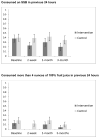Randomized Controlled Trial of a Clinic-Based Intervention to Promote Healthy Beverage Consumption Among Latino Children
- PMID: 28553726
- PMCID: PMC5553320
- DOI: 10.1177/0009922817709796
Randomized Controlled Trial of a Clinic-Based Intervention to Promote Healthy Beverage Consumption Among Latino Children
Abstract
The objective of this study was to evaluate an educational module for Latino parents about the health effects of sweet beverages. Latino parents were randomized to receive the beverage module or a control module. Child beverage consumption was assessed at baseline, 2 weeks, 2 months, and 3 months via a beverage recall survey. At 2-week follow-up, children of intervention participants had a mean reduction in 7-day total sugar-sweetened beverage and 100% fruit juice consumption of 16 ounces while controls had a mean increase of 4 ounces ( P = .01). At 2-month and 3-month follow-up, there was a reduction in mean total sugar-sweetened beverage and 100% fruit juice consumption among both intervention and control children. An educational module on beverages for Latino parents reduced child consumption of sweet beverages at 2-week follow-up. However, study participation appears to have also reduced controls' beverage consumption suggesting that frequent intensive surveys of beverage intake may be an intervention unto itself.
Keywords: Latinos; beverages; health education; obesity prevention; oral health; primary care.
Conflict of interest statement
Figures
References
-
- Edelstein BL, Chinn CH. Update on disparities in oral health and access to dental care for America’s children. Acad Pediatr. 2009;9(6):415–419. - PubMed
-
- Davis JN, Whaley SE, Goran MI. Effects of breastfeeding and low sugar-sweetened beverage intake on obesity prevalence in Hispanic toddlers. Am J Clin Nutr. 2012;95(1):3–8. - PubMed
Publication types
MeSH terms
Substances
Grants and funding
LinkOut - more resources
Full Text Sources
Other Literature Sources


